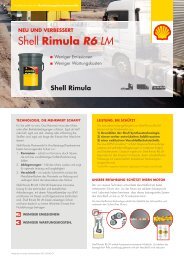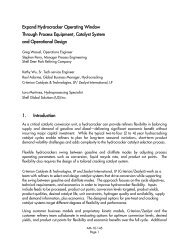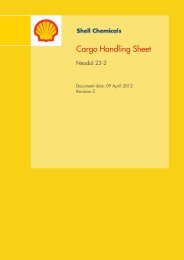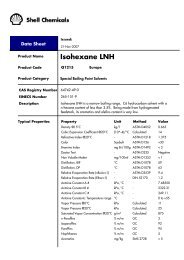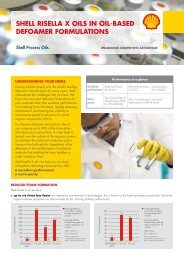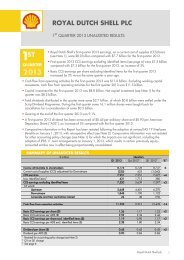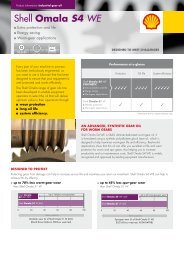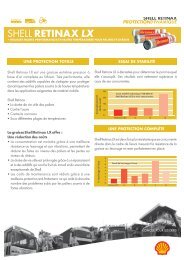THROUGHPUT AGREEMENT entered into between SHELL SOUTH ...
THROUGHPUT AGREEMENT entered into between SHELL SOUTH ...
THROUGHPUT AGREEMENT entered into between SHELL SOUTH ...
- No tags were found...
Create successful ePaper yourself
Turn your PDF publications into a flip-book with our unique Google optimized e-Paper software.
<strong>THROUGHPUT</strong> <strong>AGREEMENT</strong><strong>entered</strong> <strong>into</strong> <strong>between</strong><strong>SHELL</strong> <strong>SOUTH</strong> AFRICA MARKETING(PROPRIETARY) LIMITED(Registration No. 1961/000645/07)(“Shell”)and…………………………………….1
TABLE OF CONTENTS1 INTERPRETATIONS ..................................................................................42 DEFINITIONS .............................................................................................73 <strong>AGREEMENT</strong> .............................................................................................94 HEALTH, SAFETY, SECURITY AND ENVIRONMENT ........................... 115 OPERATING OBLIGATIONS ................................................................... 136 PRINCIPLES UNDER THE <strong>THROUGHPUT</strong> MODEL .............................. 167 PRODUCT RISK AND TRANSFER VOLUME .......................................... 178 PRODUCT UNPLANNED MOVEMENTS ................................................. 199 PRODUCT LOSSES ................................................................................ 2010 STOCK ACCOUNTING ............................................................................ 2111 STOCK RECONCILIATION ...................................................................... 2212 PRODUCT MOVEMENTS ........................................................................ 2313 INVOICING AND PAYMENT TERMS ...................................................... 2414 AUDIT ....................................................................................................... 2515 LIABILITY ................................................................................................. 2616 FORCE MAJEURE ................................................................................... 2717 GENERAL ................................................................................................ 2918 NOTICES AND DOMICILIA ...................................................................... 3319 SIGNATURE ............................................................................................. 342
ANNEXURESANNEXURE ‘A’ : STORAGE & HANDLING CHARGES ..................................... 35ANNEXURE ‘B’ : BRIDGING CHARGES ............................................................ 36ANNEXURE ‘C’ : DEPOT WITH TEMPERATURE COMPENSATED METERS . 37ANNEXURE ‘D’ : DEPOT PLANNING PROCEDURE TEMPLATE ..................... 383
1. INTERPRETATIONSIn this Agreement, unless the context otherwise indicates:1.1. “Agreement” means this Agreement and any annexures hereto;1.2. BFP: means the basic fuel price, which is the official formula, prescribed andused by the South African Government to determine the prices of regulatedpetroleum products sold in the South African market. The BFP formula is asdescribed in the document “Working Rules to Administer the Basic FuelsPrice Methodology Effective Date: 2 March 2003 (Revised on 28 October2005)” as further revised in January 2009, as published on the DME websiteand as may be amended by DME from time to time (“the Working Rules”);1.3. “Business Day” means any day other than a Saturday, Sunday or PublicHoliday officially gazetted as such in the Republic of South Africa;1.4. CEF: means CEF (Pty) Limited which is the Government regulatorresponsible for the monitoring and implementation of product priceadjustments for controlled petroleum products;1.5. “Competition Act” means the Competition Act No. 89 of 1998;1.6. “Customs and Excise Act”: means the Customs and Excise Act, No. 91 of1964, as amended from time to time1.7. "Depot" means the depots owned or leased by either Party from time to timeat which the Services are provided from time to time pursuant to thisAgreement;1.8. “Depot Manager” means the person nominated by the Party to manage theoperation of the Depot;1.9. “Effective Date” means …………………., notwithstanding the Signature Date;1.10. “Entitlement Balance” means the quantity of product that a Host or aTenant has entitlement to at a Depot, where the aggregate of the EntitlementBalances for all companies is equivalent to the physical volume in the tank;1.11. “Charge” means the Charge charged by the Host to the Tenant for theServices;1.12. "Force Majeure" has the meaning given to that term in clause 17;1.13. “Host” means the Party operating the Depot;1.14. "HSSE standards" means Health, Safety, Security and Environmentstandards;1.15. "Month" means a calendar month;4
Month M-2 shall be two months prior to delivery month MMonth M-1 shall be one month prior to delivery month MMonth M shall be the delivery month,Month M+1 shall be the immediate next month after Month M.Month M+2 shall be the immediate next month after Month M+11.16. "Non-performing Party" has the meaning given to that term in ForceMajeure clause below;1.17. “Operating Requirements” means the Hosts’ standard operationalprocedures and processes relating to the handling of Product at a Depot fromtime to time, as advised by the Parties to each other in writing from time totime;1.18. "Party" means Shell or Tenant respectively and/or "Parties" mean Shelland Tenant collectively;1.19. Prime Rate: means the publicly quoted prime rate of interest of ABSABank, per annum, compounded Monthly in arrear and prima facie proven, inthe event of there being a dispute in relation thereto and in the absence ofmanifest error, by a certificate by any general manager of ABSA Bank(whose qualification or authority need not be proven) or, in the absence of theprime rate of interest of ABSA Bank, the publicly quoted prime rate of interestof the largest domestic bank by market capitalization (excluding ABSA Bank)in South Africa1.20. "Product" means the petroleum products stored at a Depot from time totime;1.21. "PoD" means the documentation confirming proof of delivery of productto a Depot bearing the signature of the Host to receive the Product, orconfirming receipt of product from a Depot bearing the signature of theTenant, save in respect of deliveries of Product ex rail tank cars where thePoD shall be in the form of an Intac rail document bearing the description ofthe Product and the rail tank car number with a freight rail seal impressed onit;1.22. “Services” means the provision for replenishment, storage, and uplift ofProduct by a Tenant;1.23. “Shell” means Shell South Africa Marketing (Proprietary) Limited(Registration No. 1961/000645/07) of 57 Sloane Street, Twickenham Building,The Campus, Bryanston, 2021, Facsimile Number: (011) 996 7323,Telephone Number: (011) 996 7106; Contact Person: Supply & DistributionManager);1.24. “Signature Date” means the date of signature of this Agreement by thelast Party signing; and1.25. “Tenant” means ………………………………………………..5
(Registration No……………….)Address ……………………………………………..;1.26. VAT: means value-added tax levied in terms of the Value-Added TaxAct, No. 89 of 1991.6
2. DEFINITIONS2.1. Words importing the singular shall include the plural and vice versa, andwords importing the masculine gender shall include female and neutergenders and words importing persons shall include partnerships and bodiescorporate.2.2. Use of the word “including” followed by a specific example/s shall not beconstrued as limiting the meaning of the general wording preceding it and theeiusdem generis rule shall not be applied in the interpretation of such generalwording or such specific example/s.2.3. The head notes to the clauses in this Agreement are inserted for referencepurposes only and shall not affect the interpretation of any of the provisionsto which they relate.2.4. This Agreement shall be binding on and enforceable by the administrators,permitted assigns or liquidators of the Parties as fully and effectually as ifthey had signed this Agreement in the first instance and reference to anyParty shall be deemed to include such Party's administrators, permittedassigns or liquidators, as the case may be.2.5. If any provision in clauses 1 and 2 is a substantive provision conferring rightsor imposing obligations on any Party, then notwithstanding that suchprovision is contained in such clauses, effect shall be given thereto as if suchprovision were a substantive provision in the body of this Agreement.2.6. Where any term is defined within the context of any particular clause in thisAgreement, the term so defined shall, unless it appears clearly from theclause in question that such term has limited application to the relevantclause, bear the meaning ascribed to it for all purposes in terms of thisAgreement, notwithstanding that such term has not been defined in thisclause 1.2.7. When any number of days (including Business Days) is prescribed in thisAgreement, same shall be reckoned exclusively of the first and inclusively ofthe last day.2.8. Should the day for the performance of any payment obligation in terms of thisAgreement fall on a day, which is not a Business Day, then such obligationshall be performed on the next day, which is a Business Day.2.9. Save where clearly indicated to the contrary, expressions defined in thisAgreement shall bear the same meanings in any schedule and/or annexurehereto unless such schedule and/or annexure contains an alternativedefinition for the expression.2.10. The rule of interpretation that an agreement will be interpreted againstthe Party responsible for the drafting thereof, and any similar rules of7
interpretation, shall not apply to this Agreement and the Parties waive anyrights they have to rely on such rules.2.11. Any reference to any statute, regulation or other legislation shall be areference to that statute, regulation or other legislation as at the EffectiveDate, and as amended or substituted from time to time.8
3. <strong>AGREEMENT</strong>3.1. INTRODUCTIONShell and Tenant agree to enter <strong>into</strong> this Agreement in order to specify the terms andconditions upon which infrastructure Depots operated by Shell may be used forreplenishment, storage and uplift of bulk fuels by the Tenant.3.2. DURATIONThis Agreement shall commence on the Effective Date and shall endure indefinitely,provided that either Party may terminate this Agreement upon 12 (twelve) monthswritten notice to the other Party and provided further that in respect of the provisionof the Services at any particular Depot pursuant to this Agreement:The Tenant may terminate the provision of the Services on 3 (three) months writtennotice to the Host to such effect; andThe Host may terminate the provision of the Services on 6 (six) months writtennotice to the Tenant to such effect.3.3. RELATIONSHIP OF THE PARTIESThe relationship of the Parties inter se shall be governed by the terms of thisAgreement and nothing contained herein shall be deemed to constitute a partnership<strong>between</strong> the Parties, or entitle or authorize either Party to incur liability on behalf ofthe other.The Parties shall be obliged to obtain competition law compliance training, on anannual basis, so as to ensure that the conduct of the Parties in terms of thisAgreement complies with the Competition Act.Parties may come together at any other time to revise terms and definitions ifprompted by industry market or regulatory changes.3.4. <strong>AGREEMENT</strong> REVIEWThe Parties shall conduct an annual review not later than October of each year andagreement reached no later than by the end of the calendar year. The reviews shallalways include, but will not be limited to:HSSE reports;Service Standards;Operational Requirements and operational changes; andCharges and Tariffs.Both Parties shall ensure that:9
an agenda is prepared in respect of the aforesaid meetings;Discussions at the meetings shall be limited to those items on the agenda; andThe agenda is approved by each Party’s legal counsel.10
4. HEALTH SAFETY SECURITY AND ENVIRONMENT4.1. STANDARDSThe HSSE standards of the Host will be the applicable standard in respect of eachDepot, save where the prevailing industry norm is higher, in which case the same willinstead be complied with and be preferred, and the Host shall make available to theTenant the relevant HSSE standards.The Host shall be entitled at its sole discretion to amend and vary the HSSEstandards from time to time. In the event that there are any amendments to orvariations of the Host’s HSSE standards, the Host shall notify the Tenant in writing ofsuch amendment and/or variation and such amendment and/or variation will beavailable to the Tenant.In addition, the Parties will adhere to the HSSE standards set out below. Shouldthere be a conflict <strong>between</strong> any of the HSSE standards of the Host and the HSSEstandards set out in this clause, the standards set out below shall prevail.4.2. VEHICLESThe Tenant shall ensure that all its vehicles are compliant with the HSSE standardsin terms of the safe loading pass and in the event that it is not so compliant, the Hostshall be entitled to prohibit entry of such vehicle at the Depot. The Party appointing athird party contractor shall ensure that the aforesaid contractor attends regularmeetings and workshops in relation to the management and operation of the Depotand HSSE standards.4.3. DEPOT AND EQUIPMENTThe Host shall ensure that it will comply with all relevant legal requirements, local oilindustry practice and its own HSSE standards.4.4. OPERATIONSThe Host shall ensure that all operations carried out in fulfilling the handling of bulkfuels are in accordance with all applicable legislative requirements, codes, standardsand procedures relating to HSSE or where there is no applicable legislation, its ownHSSE standards and procedures.4.5. PERSONNELThe Host shall ensure that all its employees, the Tenant's employees, all contractorpersonnel and authorized agents are fully trained in the HSSE aspects in regard tothe usage of all Depots and equipment. The Host shall maintain records of trainingand competence and produce such records if required during an inspection or audit.4.6. INCIDENT REPORTING11
In accordance with the incident reporting procedures implemented by the Host at theDepot (as advised by the Host to the Tenant in writing from time to time), anyincidents must be reported in the following time frames:Fatalities – immediately;Lost time injuries – within 24 hours;Medical treatment cases – within 24 hours; andSpillages – within 24 hours.4.7. CONTAMINATION AND SPILLAGESClean-up costs and other liabilities resulting from the contamination of soil or groundwater shall be borne by the Host, except where and to the extent that thecontamination results from the willful default or negligence of the Tenant or itsauthorized personnel or agents, in which case such cost or other liabilities will be thesole responsibility of the Tenant.12
5. OPERATING OBLIGATIONS5.1. OBLIGATIONS OF THE HOSTThe Host shall:5.1.1. Be responsible for the management and operation of the Depot;5.1.2. Test Product for quality, measure and receive Product <strong>into</strong> storage inthe Depot;5.1.3. In the case of any Product stock-out (being an unavailability of Productto the Tenant to which the Tenant is entitled pursuant to the applicationof the Banking Principle) for a Tenant due to use of this Tenant’s stock bythe Host and not excused by the Force Majeure provisions of thisAgreement, the Host shall be responsible for alternate sourcing of theaffected Product and all related costs. Should the Host fail to source theaffected Product, the Tenant will be entitled to procure the Product at itscost and recover direct incremental and reasonable costs from the Hoston written request;5.1.4. Be responsible to ensure that the Product does not deteriorate orbecome contaminated as a result of storage and handling of the Productby the Host;5.1.5. Ensure that additive doping standards are met and that mandatoryreporting takes place at the prescribed schedule;5.1.6. After a formal handover process by the Tenant to the Host of theadditive injection systems on completion of an agreed Management ofChange, maintain and repair the additive injection systems in order tominimize downtime; and5.1.7. No manual additive injection will be allowed.5.1.8. The Parties shall ensure that load rack meters at the Depots meet therequirements of the regulations framed under the Trade Metrology Act No77 of 1973, as amended.5.2. OBLIGATIONS OF THE TENANT5.2.1. The Tenant shall in respect of each Depot at which it receives theprovision of the Services:5.2.2. Install the additive injection system/s at the Depot at its cost, and followa formal handover procedure;5.2.3. Ensure that all drivers and vehicles, either employed by the Tenant, itsagents, sub-contractors or distributors comply with and are trained in theHost’s Safe Working Procedures and Safe Loading requirements in13
espect of the Depot concerned applicable from time to time, as notifiedin writing by the Host to the Tenant from time to time;5.2.4. Ensure the safety and health of its employees utilizing the Depot andprotection of the environment, including compliance with the statutoryrequirements imposed by, but not limited to, the Occupational Health andSafety Act No.85 of 1993; the Atmospheric Pollution Prevention Act No.15 of 1973, the Environmental Conservation Act No. 73 of 1989, theNational Environmental Management Act No. 107 of 1998, and all otherapplicable legislation, by-laws and regulations;5.2.5. Ensure that all of its vehicles and that of its agents, contractors anddistributors together with the associated equipment meet all legislativerequirements and the HSSE standards of the Host;5.2.6. Ensure that all drivers and vehicles, either employed by the Tenant, itsagents, contractors or distributors are trained in accordance with theHSSE standards of the Host;5.2.7. Attend monthly safety meetings and participate in emergency drills;and5.2.8. Ensure that vehicle, compartmentation changes on their TAS systemare only made by their staff using the centralized data applicationprocess within Shell and that no changes to data are to be made withoutthe approval of this channel. - Central scheduling TAS administration.5.3. PRODUCT QUALITY CONTROL5.3.1. Both Parties will have standard quality procedures at Depots.5.3.2. In the case of aviation Products, the Host will adhere to provisions of itsown aviation quality control, save where the prevailing industry norm ishigher, in which case the same will instead be complied with and bepreferred, and will be responsible for ensuring that on-specificationProducts are handed over to the aviation depot, agent or customerhandling the airfield storage arrangement.5.3.3. Both Parties will implement similar safety procedures for illuminatingparaffin. On request, a Party will provide these procedures for scrutiny tothe other Party. If either Party does additional testing in relation to theother this procedure should be performed if found to be necessary.5.3.4. If it is suspected that a Product is not to specification, the Host willprovide a quality certificate for this product to the Tenant.5.4. ADDITIVESThe Host will be responsible for:14
5.4.1. The storage and handling of the Tenant's additives and, whereapplicable, this includes offloading drums;5.4.2. Injecting the additives <strong>into</strong> the Products as per the Tenant’s instructions;5.4.3. Submitting a monthly spreadsheet showing the additive stocks andusage to the Tenant; and5.4.4. Submitting doped fuel samples as required by the Tenant to theTenant's laboratory at the Tenant’s cost.The Tenant shall:5.4.5. Ensure that sufficient additives are available at the Depot at all times;5.4.6. Notify the Depot Owner in writing of the applicable dosage rates; and5.4.7. Provide the Material Safety Data Sheets to the Depot Owner.5.4.8. Notify the Depot Owner of any amendments or variations to Productspecifications and the Material Safety Data Sheets within 14 (fourteen)days prior to such amendment or variation.5.5. NEW PRODUCTS5.5.1. A Tenant introducing a Product not previously stored at a Depot shallonly do so with the prior written approval of the Host and shallfurthermore before so introducing such Product, provide full details in theform of Material Safety Data Sheets and other relevant documents whereapplicable in advance to the Host in order for the Host to comply with alllegal obligations and other agreed HSSE procedures and codes ofpractice with particular attention to the Occupational Health and SafetyAct No. 85 of 1993.5.5.2. Both Parties agree that such new products are subject to amanagement of change process covering systems and businessprocesses.15
6. PRINCIPLES UNDER THE <strong>THROUGHPUT</strong> MODELUnder the “Throughput Model”:6.1. The Host will operate all Storage and Handling activities at the Depot.6.2. The Host and the Tenant may each replenish product <strong>into</strong> the Depot.6.3. The Host and the Tenant may each uplift product from the Depot.6.4. The Host and the Tenant will each retain Title to their respective productentitlements stored at the Depot.6.5. The Host will assume responsibility for insurance risk for the full volume ofproduct stored at the Depot.6.6. The Host will be accountable for the full loss/gain at the Depot, as measuredduring the Stock Count cycle.6.7. Storage & Handling charges must be billed based upon a schedule of Upliftsby the Tenant reported by the Host. The charges billed for Storage &Handling are set out in the Annexures.6.8. Tenants will be obliged to have positive stocks at all Depots at all times toensure availability of product at the Depot for uplifting of such product byTenant at each Depot. This will also oblige the Host not to go negative anduse Tenant stock except by agreement as this may constrain the Tenant.6.9. In the event that a Party requires Product to be uplifted in excess of itsentitlement to such Product at the Depot, it is hereby agreed that in order toaccommodate such requirements, the Party needing product shall do an intankpurchase. The in-tank purchase should be done upfront to prevent theParty from going negative. However, where in exceptional cases, atemporary negative position is permitted for operational reasons, thisnegative position should be corrected within three (3) days, and also beforemonth-end close of accounts.6.10. In the event that the Parties do not agree the Product Entitlementbalance, or if there are any un-reconciled volumes or disputes, it will then beassumed that the entitlement balance per the Host ERP is the correctbalance for product scheduling purposes.6.11. Subject to the entitlement balance of the Tenant, the Host shall supplythe Tenant's requirements of Products from the Depot.6.12. In the event where a stock-out at a Depot occurs due to circumstancesbeyond the control of the Host or Tenant, or a Force Majeure event, the Hostshall notify the Tenant of such stock-out as soon as reasonably possible.16
7. PRODUCT RISK AND TRANSFER VOLUME7.1. REPLENISHMENTS BY SEA7.1.1. Where a Tenant replenishes by Sea the risk passes from the Tenant atthe vessels flange.7.1.2. The transfer volume will be the volume receipted <strong>into</strong> the tanks, asconfirmed by the surveyors on the P201 document.7.2. REPLENISHMENTS BY PIPELINE7.2.1. Where a Tenant replenishes by Pipeline, the Risk passes from theTenant at the designated pipeline entry point.7.2.2. For product movements by Transnet Pipelines, the transfer volume willbe the volume confirmed by the Transnet Pipelines docket showing thevolume received at the inlet flange.7.2.3. For product movements at the refinery supplied Depots, Cape Townand Mossel Bay terminals, the transfer volume will be calculated from thedifference <strong>between</strong> the before and after dip of the Depot receiving tanks.The transfer volume will be the volume apportioned on the advice fromthe Host Party.7.3. REPLENISHMENTS BY RAIL7.3.1. Where a Tenant replenishes by Rail, the Risk passes from the Tenantat the flange of the rail tank car.7.3.2. The transfer volume will be as per the bill of lading from the sendingDepot.7.4. REPLENISHMENTS BY ROAD7.4.1. Where a Tenant replenishes by Road, the Risk passes from the Tenantat the flange from bridging vehicle.7.4.2. The transfer volume will depend on the confirmation of installation oftemperature compensated meters at the Depot. The list where the Depotdoes have temperature compensated meters is set out in the Annexureshereto.7.4.3. Metered Road Receipt: If the receiving Depot does have temperaturecompensated meters at the discharge location, then the dischargevolume is to be used as the transfer volume.7.4.4. Meter-less Road Receipt: Seals Intact: If the receiving Depot does nothave temperature compensated meters at the discharge location, and ifthe seals on the bridging vehicle are intact and the seal numbers17
correspond to the seal numbers on the bill of lading, then the load volumeon the bill of lading at the supply dispatch point is to be used as thetransfer volume.7.4.5. Meter-less Road Receipt: Seals Not Intact: If the receiving Depot doesnot have temperature compensated meters at the discharge location, andif the seals on the bridging vehicle are not intact, then the product is notto be received by the receiving Depot. The Host must immediately informthe replenishing Party of the non-compliance, and the Tenant mustadvise the Transporter what to do with the load.7.5. UPLIFTS BY SEA7.5.1. Where a Tenant uplifts by Sea, the Risk passes to the Tenant at theflange of the vessel.7.5.2. The transfer volume will be the volume loaded onto the vessel, asconfirmed by the Surveyors.7.6. UPLIFTS BY PIPELINE7.6.1. Where a Tenant uplifts by Pipeline, the Risk passes to the Tenant atthe flange of the designated pipeline entry point.7.6.2. The transfer volume will be the volume filled <strong>into</strong> the pipeline, asconfirmed by the docket.7.7. UPLIFTS BY RAIL7.7.1. Where a Tenant uplifts by Rail, the Risk passes to the Tenant at theflange of rail tank car.7.7.2. The transfer volume will be the volume loaded <strong>into</strong> the rail tank car, asmeasured by the ullage.7.8. UPLIFTS BY ROAD7.8.1. Where a Tenant uplifts by Road, the Risk passes to the Tenant at theflange of vehicle.7.8.2. The transfer volume will be the volume loaded <strong>into</strong> the vehicle, asmeasured by the gantry meter.18
8. PRODUCT UNPLANNED MOVEMENTS8.1. PRODUCT RETURN TO DEPOT8.1.1. Under certain circumstances, a Tenant may require to return Product toa Host Depot from a vehicle.8.1.2. This should only be done if all other means of solution have beenexhausted, and there are no further options to consider. For example,vehicles should be re-routed to another customer site, or vehiclescheduling should be adjusted so that compartments can be optimallyloaded on successive loads, before this may be considered as an option.8.1.3. The Tenant must obtain permission from a Host before such productmay be returned to a Host Depot.8.1.4. The Product return to Depot excludes Illuminating Paraffin.8.1.5. The Product return to Depot is limited to 2,000 litres per trip for otherProducts.8.1.6. The volume of Product returned must be credited to the Tenantaccount at the Depot.8.2. ILLUMINATING PARAFFIN FLUSHINGS8.2.1. Illuminating Paraffin flushing may be performed on condition that theDepot is able to flush product.8.2.2. Risk will change once the Product is loaded <strong>into</strong> the vehicle.8.2.3. The transfer volume will be the volume loaded <strong>into</strong> the vehicle, asmeasured by the gantry meter.8.2.4. Risk will change again once the Product is returned to the Depot tank.8.2.5. The transfer volume will be the volume returned to the Tank.8.2.6. The volume of Product loaded and returned must be debited andcredited to the Tenant account at the Depot.8.3. CONTAMINATIONS8.3.1. Where possible, the Depot Owner will accept contaminated Product tothe extent that such Product can be taken <strong>into</strong> the storage tank withoutcompromising the quality of the contents of the tank.8.3.2. The Tenant must obtain permission from a Host before suchcontaminated product may be returned to a Host Depot. Such permissionshould be obtained from the respective Supply Management teams.19
9. PRODUCT LOSSES9.1. REPLENISHMENT LOSSES9.1.1. All replenishment losses are borne by the Party responsible forarranging or contracting the replenishment transport.9.2. STORAGE LOSSES9.2.1. Tank storage losses and gains are for the Host account.9.3. DELIVERY LOSSES9.3.1. All delivery transport losses and gains are for the Party responsible forarranging or contracting the delivery transport.20
10. STOCK ACCOUNTING10.1. MEASUREMENT10.1.1. All road gantry pick-ups will be at 20° C at automated gantriesand ambient at non - automated gantries.10.1.2. All metered sales in respect of Customer Own Collections will beprocessed at ambient temperature.10.1.3. All non-metered vehicles’ (SPD) measurement procedures shallbe based on vehicle compliance.10.1.4. The gantry meters through which Product is supplied to theTenant will be calibrated according to Trade Metrology Act, No 77 of1973 or applicable SABS code.21
11. STOCK RECONCILIATION11.1. DAILY11.1.1. The Host Party must provide an electronic data file and a pdftype report to the Tenant Party specifying the movements of the Tenantfor day-1, for each Depot, detailing Product grade, volumes and Methodof Transport. This report should be delivered by the Host to the Tenant by12h00 on the day following the transactions. Transactions for the weekendshould be included on the Monday report.11.1.2. The Host must ensure that all picks up are recoded daily on thereport, based on liftings at gantry. There must be accurate and timelyrecording of transactions for Tenant's account by the Host, and timelycorrective actions taken on errant transactions when identified.11.2. ANNUALLY11.2.1. The annual sign-off for December movements must beconcluded in time for the Audit Review of both Parties.22
12. PRODUCT MOVEMENTS12.1. IN-TANK PURCHASES AND SALES12.1.1. The parties agree that certain “In-tank” transactions may takeplace from time to time.12.1.2. An In-Tank transaction <strong>between</strong> the Parties will always betreated as two separate transactions, and will be recorded at the Depot ofthe Host.12.1.3. In the Host book of accounts, these transactions are:12.1.4. A Sale/Purchase for a volume of product12.1.5. A Throughput Receipt/Issue for an equivalent volume of product.12.1.6. In the Tenant book of accounts, these transactions are:12.1.7. Purchase/Sale for a volume of product12.1.8. A Throughput Issue/Receipt for an equivalent volume of product.12.1.9. The Parties agree that Pricing of Product for In-Tank Purchasesand Sales transactions should be negotiated on a Spot basis.12.1.10. The Parties agree that Bridging Charges as indicated in theAnnexure B is applicable to the in-tank purchases and sales.12.1.11. The Parties agree that Excise Duties are applicable to the intankpurchases and sales.12.2. <strong>THROUGHPUT</strong> MOVEMENTS12.2.1. The Parties agree that in consideration for the ThroughputServices, the Tenant shall pay the charges to the Host. These chargesare Storage & Handling Charges as indicated in Annexure A.23
13. INVOICING AND PAYMENT TERMS13.1. INVOICING13.1.1. By the 5th (fifth) Business Day of each month, the Host shallissue to the Tenant a tax invoice in respect of the Buy/Sell transactionsand Services rendered during the immediately preceding month.13.1.2. Each Purchase/Sale transaction from the selling Party to thebuying Party shall contain the following information:13.1.3. Depot name;13.1.4. Product volume, price, and applicable excise duties;13.1.5. The amount of value added tax owing in relation to suchproducts.13.1.6. Each Throughput Movement invoice shall contain the followinginformation:13.1.7. Depot name;13.1.8. Throughput Volume13.1.9. The amount for the service rendered;13.1.10. The amount of value added tax owing in relation to suchServices.13.2. PAYMENT TERMS13.2.1. The Tenant shall pay the invoiced amounts due on the 15th dayof month following the month of delivery.13.2.2. All payments made by the Tenant to the Host in terms of thisAgreement shall be made by electronic funds transfer, free of exchange,deduction or set-off <strong>into</strong> an account nominated by the Host.13.2.3. In the event of any payment not being made on due date, theamount due and owing shall bear interest at Prime Rate and shall becalculated from the day that such amount is due until the date of payment.24
14. AUDIT14.1. HOST AUDIT14.1.1. The Host will be responsible for auditing of their own Depots.Such audits should be in accordance with the respective Host companyrequirements, and should cover subjects including HSSE, product quality,procedures, vehicle inspections, and stock reconciliations.14.2. TENANT AUDIT14.2.1. The Host shall allow HSSE and Product Quality audits to beconducted by the Tenant from time to time. The Tenant's internal auditunit may inspect the Depot, and visit Depots accompanied by the Host'sinternal audit unit, or other such authorized personnel.14.3. DOCUMENT RETENTION14.3.1. The Host agrees to retain all documentation for the duration ofthree years.14.3.2. The documentation referred includes all documents where theParties have replenished or uplifted product from/to the other Party’slocation, including:14.3.3. Product receipt documentation;14.3.4. Product uplift documentation;14.3.5. Customer proof of collection documentation; and14.3.6. Services rendered.25
15. LIABILITY15.1. PERFORMANCE15.1.1. The liability of the Host to the Tenant in respect of theperformance or non-performance of the Host's duties hereunder shall belimited to the performance or re-performance thereof together with aclaim for damages but shall exclude an entitlement to terminate thisAgreement other than pursuant to clause 18.15.1.2. Save as may arise pursuant to a breach of an obligationimposed on either Party in terms of this Agreement, no Party shall haveany claim for damages against the other pursuant to the terms of thisAgreement. Neither Party shall have any liability to the other Party atany time for indirect losses, consequential damages and/or loss of profitand/or loss of market share.15.1.3. Other liabilities relating to the Services and the implementationof this Agreement shall be borne as follows:15.2. PROPERTY15.2.1. A Party shall not be liable for any loss or damage to the propertyof the other Party except where such loss or damage results from thenegligence or willful default of the first-mentioned Party or its authorizedpersonnel or agents.15.2.2. Each Party shall assume responsibility for insurance for loss ordamages to its own property and where jointly owned property exists,their portion of such property.15.3. PERSONNEL15.3.1. Liabilities in respect of claims arising as a result of death, injuryor disease to personnel shall be borne:15.3.2. In the case of a Party's own employees or sub-contractors, bythat Party; and15.3.3. In the case of other personnel, by the Host or alternativelyequally by both Parties.15.4. THIRD PARTY15.4.1. Liabilities to any Third Party shall be borne by the Host, however,if the damage / injury is caused by a Tenants vehicle or Tenantspersonnel inside the Depot property then this liability should then beborne by the Tenant.26
16. FORCE MAJEURE16.1. FORCE MAJEURE CONDITIONS16.1.1. "Force Majeure" for the purposes of this Agreement means anyevent or condition (whether affecting a Party or any other person), whichhas prevented or delayed or will prevent or delay a Party from performingany obligation hereunder (except obligations to make payments whendue, to which obligations in respect of Force Majeure shall not apply), inwhole or in part, if such event or condition, and such prevention or delay,is beyond the reasonable control of the Party relying thereon asjustification for not performing any such obligation (the "Non-PerformingParty") and such event or condition, and such prevention or delay, couldnot have been prevented or overcome by exercise of reasonable care bythe Non-Performing Party.16.1.2. Such events or conditions shall, provided always that they meetthe requirements set forth in this clause, include but shall not be limited tocircumstances of the following kind:16.1.3. Acts of government(s), acts of the public or foreign enemy, wardeclared or undeclared, hostilities (whether or not war has beendeclared), blockades, embargoes, military action, civil disturbances,public demonstrations, insurrection, riots, acts of terrorism, acts ofsabotage, vandalism, aircraft crashes, chemical or biologicalcontamination, nuclear incidents or similar occurrences;16.1.4. Acts of God, landslides, lightning, earthquakes, fires, explosions,storms or storm warnings, floods, extreme weather conditions, washouts,epidemics or similar occurrences;16.1.5. Strikes, boycotts, lockouts, and other similar industrial or labourdisputes and disturbances; and16.1.6. Inability to obtain the grant or renewal of any license or approvalnecessary for operation of the Refinery, the necessity for compliance withany court order, law, statute, ordinance or regulation promulgated by agovernmental entity having jurisdiction.16.1.7. If the Non-Performing Party is prevented, hindered or delayedfrom performing any of its obligations under this Agreement by reason ofForce Majeure, the Non-Performing Party shall be relieved fromperformance of its obligations under this Agreement to the extent that theNon-Performing Party is unable to deliver or receive the agreedquantities of Products or to perform any of its other obligations under thisAgreement. Such obligations of the Non-Performing Party and anycorresponding or related obligations of the other Party shall be of noeffect, without liability, for a period equal to the duration of the event orcondition of Force Majeure, provided that the Non-Performing Party shallnotify the other Party of the nature, extent, effect and the likely duration of27
the circumstances constituting Force Majeure or expected to constituteForce Majeure as soon as reasonably possible.16.1.8. As soon as reasonably practical after the end of the event orcondition of Force Majeure the Non-Performing Party shall notify theother Party in writing that the event or condition of Force Majeure hasended and shall resume performance of its obligations under thisAgreement.16.1.9. For the avoidance of doubt, neither Party shall be released fromany of its obligations or liabilities under this Agreement arising prior to anevent or condition of Force Majeure, and this Agreement shall remain ineffect for the duration of the event or condition of Force Majeure.16.1.10. The Non-Performing Party shall use all reasonable efforts tomitigate the impact of Force Majeure and to remedy its inability toperform as quickly as is reasonably possible.28
17. GENERAL17.1. CONDITIONS17.1.1. This Agreement constitutes the whole of the agreement <strong>between</strong>the Parties hereto relating to the matters dealt with in this Agreement andsave to the extent otherwise provided herein no undertaking,representation, term or condition relating to the subject matter of thisAgreement not incorporated in this Agreement shall be binding on any ofthe Parties.17.1.2. No variation, addition, deletion, or agreed cancellation will be ofany force or effect unless agreed in writing <strong>between</strong> the Parties hereto.17.1.3. No waiver of any of the terms and conditions of this Agreementwill be binding or effectual for any purpose unless in writing and signedby or on behalf of the Party giving the same. Any such waiver will beeffective only in the specific instance and for the purpose given. Nofailure or delay on the part of either Party hereto in exercising any right,power or privilege hereunder will constitute or be deemed to be a waiverthereof, nor will any single or partial exercise of any right, power orprivilege preclude any other or further exercise thereof or the exercise ofany other right, power or privilege.17.1.4. Neither this Agreement nor any part, share or interest thereinnor any rights or obligations hereunder may be ceded, assigned, orotherwise transferred by either Party without the prior written consent ofthe other, provided that such consent shall not be required in the eventthat the rights and obligations of either Party are ceded, assigned orotherwise transferred to any Affiliate.17.1.5. Any consent or approval required to be given by any Party interms of this Agreement will, unless specifically otherwise stated, not beunreasonably withheld or delayed.17.1.6. This Agreement may be executed in one or more counterparts,each of which shall be deemed an original, and all of which together shallconstitute one and the same Agreement as at the date of signature of theParty last signing one of the counterparts. The Parties undertake to takewhatever steps may be necessary to ensure that both counterparts areduly signed by each of them.17.2. APPLICABLE LAW17.2.1. This Agreement will in all respects be governed by andconstrued under the laws of the Republic of South Africa.17.2.2. Subject to the provisions of this Agreement, the Parties heretohereby consent and submit to the non-exclusive jurisdiction of the Capeof Good Hope Provincial Division of the High Court of the Republic of29
South Africa in respect of any dispute arising from or in connection withthis Agreement. The Parties agree that any costs awarded will berecoverable in accordance with the High Court tariff, determined on anattorney-and-own-client scale.17.3. SEVERABILITY17.3.1. Each provision of this Agreement is severable from the otherprovisions. Should any provision be found by a Court of competentjurisdiction to be invalid or unenforceable for any reason, the Parties willconsult with one another in good faith in order to agree, if possible, analternative provision in accordance with the intent and tenor of thisAgreement. The remaining provisions of this Agreement shallnevertheless remain binding and continue with full force and effect.17.4. MEDIATION AND ARBITRATION17.4.1. In the event of any dispute or difference arising <strong>between</strong> theParties hereto relating to or arising out of this Agreement, including thevalidity, implementation, execution, interpretation, rectification,termination or cancellation of this Agreement, the said dispute ordifference shall be referred to the Party's Supply Managers for urgentmediation.17.4.2. If no resolution is reached and recorded in writing within 20(twenty) Business Days of referral to the Supply Managers, such disputemay on written demand by any Party to the dispute be submitted toarbitration in accordance with the rules of the Arbitration Foundation ofSouthern Africa ("AFSA") by an arbitrator or arbitrators appointed byAFSA and agreed to by the Parties.17.4.3. Should the Parties fail to agree on an arbitrator within 10 (ten)Business Days after arbitration has been demanded, the arbitrator shallbe nominated at the request of any Party to the dispute by AFSA.17.4.4. The Parties irrevocably agree that the submission to arbitrationin terms of this clause 31 is subject to the Parties' rights of appeal set outhereunder.17.4.5. Any Party to the arbitration may appeal the decision of thearbitrator within a period of 20 (twenty) Business Days after thearbitrator's ruling has been handed down by giving written notice to thateffect to the other Party or Parties to the arbitration. The appeal shall bedealt with in accordance with the rules of AFSA by a panel of threearbitrators appointed by AFSA.17.4.6. The decision of the arbitrator shall be final and binding on theParties to the arbitration after the expiry of the period of 20 (twenty)Business Days from the date of the arbitrator's ruling if no appeal hasbeen lodged by any Party. A decision, which becomes final and binding30
in terms of this clause 31 may be made an order of court at the instanceof any Party to the arbitration.17.4.7. Nothing herein contained shall be deemed to prevent or prohibitany Party from applying to the appropriate court for urgent relief.17.4.8. The provisions of this clause 31 will continue to be binding onthe Parties notwithstanding any termination or cancellation of theAgreement.17.5. EXPERT17.5.1. Whenever under this Agreement any matter is to be referred toan expert, and whenever during the term of the Agreement, the Partiesagree that a point of difference <strong>between</strong> them shall be resolved by anexpert, the provisions of this clause 32 shall apply unless modified by anyother express provision.17.5.2. The procedure for the appointment of an expert shall be asfollows:17.5.3. The Party wishing the appointment to be made shall give noticeto that effect to the other Party and with such notice shall give details ofthe matter which it is proposed shall be resolved by the expert;17.5.4. The Parties shall meet in order to agree upon an expert; and17.5.5. If within 5 (five) Business Days from the service of the saidnotice the Parties have failed to meet or failed to agree upon an expert,then the matter may forthwith be referred by either Party to the chairmanof the South African Petroleum Industry Association (“SAPIA”) who shallbe requested to select an expert within 5 (five) Business Days and in sodoing take such independent advice as he thinks fit.17.5.6. The expert shall specify the procedure to be adopted by theParties in the hearing of the dispute.17.5.7. The expert shall be entitled to obtain such independent,professional and/or technical advice as he may reasonably require.17.5.8. The expert shall give full written reasons for his determinationand shall furnish the Parties therewith within 5 (five) Business Days afterthe conclusion of the hearing.17.5.9. The expert shall be deemed not be an arbitrator but shall renderhis determination as an expert and any law relating to arbitration shall notapply to such expert or his determination or the procedure by which theexpert reaches his determination.31
17.5.10. The final determination of the expert shall be conclusive andbinding upon the Parties, save in the event of fraud, manifest error, orfailure by the expert to disclose any relevant interest.17.6. COSTS17.6.1. Save as may be otherwise provided herein, each Party will bearand pay its own costs of and incidental to the negotiation, drafting andpreparation of this Agreement.17.7. BREACH17.7.1. If either Party commits any material breach of its obligations andfails to remedy such breach within 14 (fourteen) days of notice beinggiven to it by the other Party requiring the same to be remedied, then theother Party shall be at liberty in every such case by notice in writing toterminate this Agreement without prejudice to the rights of either Partyhereto in respect of any breach of any of the terms herein contained,save as provided for in clause 1.1 above.17.7.2. Notwithstanding anything to the contrary herein contained andsave as provided for in clause 1.1 above, this Agreement may beterminated by either Party in the event that:17.7.3. A order is made by any Court of competent jurisdiction, whetherprovisional or final, for the winding up or the judicial management ofeither Party;17.7.4. Either Party passes a resolution for the voluntary winding up ofsuch Party;17.7.5. Either Party ceases to carry on business or disposes of itsbusiness or changes the fundamental nature of its business and/ordisposes of the major portion of its assets other than for value;17.7.6. A Party compromises generally with its creditors otherwise thanin the course of the re-structuring of its capital or the merger of suchParty with a third Party; or17.7.7. The business of either Party is nationalized.17.8. EFFECT OF TERMINATION17.8.1. The termination of this Agreement shall not affect any rights ofeither Party, which accrued prior to the date of termination.32
18. NOTICES AND DOMICILIA18.1. NOTICE18.1.1. Each of the Parties chooses domicilium citandi et executandi(“domicilium”) for the purposes of the giving of any notice, the payment ofany sum, the serving of any process and for any other purposes arisingfrom this Agreement at their respective addresses set forth in clause 1hereof.18.1.2. Each of the Parties shall be entitled from time to time, by writtennotice to the other, to vary its domicilium to any other address within theRepublic of South Africa which is not a post office box or poste restante.18.1.3. Any notice given and any payment made by a Party to any ofthe others (“the addressee”) which:18.1.4. Is delivered by hand during the normal business hours of theaddressee at the addressee's domicilium for the time being shall bepresumed, until the contrary is proved by the addressee to have beenreceived by the addressee at the time of delivery;18.1.5. Is posted by prepaid registered post from an address within theRepublic of South Africa to the addressee at the addressee's domiciliumfor the time being shall be presumed, until the contrary is proved by theaddressee, to have been received by the addressee on the 10th (tenth)day after the date of posting.18.1.6. Where, in terms of this Agreement any communication isrequired to be in writing, the term “writing” shall include communicationsby facsimile or electronic mail. Communications by facsimile shall,unless the contrary is proved by the addressee, be deemed to have beenreceived by the addressee 24 (twenty-four) hours after the time oftransmission. Communications by way of electronic mail shall, unless thecontrary is proved by the addressee, be deemed to have been receivedby the addressee 24 (twenty four) hours after the time of transmission.33
SIGNATUREFOR: <strong>SHELL</strong> <strong>SOUTH</strong> AFRICA MARKETING (PROPRIETARY) LIMITEDDATED AT ___________________ ON THIS THE _____DAY OF _________ 20xx.NAME:SIGNATURE:CAPACITY OF SIGNATORY:__________________________________________________________________Who warrants that he is duly authorised theretoAS WITNESSES:1. NAME: ____________________ SIGNATURE: ______________________2. NAME: ____________________ SIGNATURE: ______________________FOR: TenantDATED AT ___________________ ON THIS THE _____DAY OF ________ 20xx.NAME:SIGNATURE:CAPACITY OF SIGNATORY:__________________________________________________________________Who warrants that he is duly authorised theretoAS WITNESSES:1. NAME: ____________________ SIGNATURE: ______________________2. NAME: ____________________ SIGNATURE: ______________________34
Annexure ‘A’Version 1DateSTORAGE & HANDLING CHARGES__________________________________________________________________The following Storage & Handling Charges are applicable effective 01 January 20.. :<strong>SHELL</strong> DEPOTSAlbertonIsland ViewKimberleyKroonstadLadysmithMossel BayPolokwanePort ElizabethRockydriftWitbankSTORAGE & HANDLING CHARGEXxx c/lXxx c/lXxx c/lXxx c/lXxx c/lXxx c/lXxx c/lXxx c/lXxx c/lXxx c/l35
Annexure ‘C’Version 1Date ……….DEPOT WITH TEMPERATURE COMPENSATED METERS__________________________________________________________________The following Depots have temperature compensated meters for road receipts:<strong>SHELL</strong> DEPOTSAlbertonIsland ViewKimberleyKroonstadLadysmithMossel BayPolokwanePort ElizabethRockydriftWitbankMetersYesNoYesYesYesNoYesNoYesYes37
Annexure ‘D’Version 1Date ……….DEPOT PLANNING PROCEDURE TEMPLATE__________________________________________________________________DEPOT……………………………HOST……………………………TENANT……………………………ProductsParaffinULP95Petrol AdditiveLRP95LSDieselULSDieselDiesel AdditiveReplenishmentLogistics Mode(Sea/Pipe/Rail/Road)Throughput SalesAverage Volume(Monthly)Comment38



